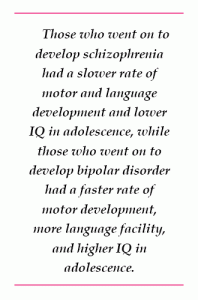Adolescent Brain Particularly Susceptible to Decline in IQ from Marijuana Use
 A decades-long study in New Zealand suggests that people who use marijuana persistently during adolescence lose 8 IQ points by adulthood compared to their peers who never use marijuana. Quitting or reducing cannabis use after adolescence did not restore the intellectual abilities in those who used it persistently in their youth. This is the first study of its kind that controlled for differences in functioning that existed before adolescence.
A decades-long study in New Zealand suggests that people who use marijuana persistently during adolescence lose 8 IQ points by adulthood compared to their peers who never use marijuana. Quitting or reducing cannabis use after adolescence did not restore the intellectual abilities in those who used it persistently in their youth. This is the first study of its kind that controlled for differences in functioning that existed before adolescence.
Participants took part in neuropsychological testing at the age of 13, prior to any cannabis use, and then were periodically interviewed about their use of the drug (at the ages of 18, 21, 26, 32, and 38). At age 38 they underwent IQ testing again.
Although persistent cannabis users tended to have fewer years of education, the lack of education was not responsible for the difference in adult IQ.
Those participants who only began using cannabis persistently in adulthood did not see a decline in IQ, suggesting that the adolescent brain is particularly susceptible to damage from cannabis use.
Schizophrenia v. Bipolar Disorder: Different Risk Factors
 Robin Murray gave a plenary presentation at the 65th Annual Scientific Convention of the Society of Biological Psychiatry this year, in which he indicated that the genetic risk for schizophrenia and other major mental disorders may be overestimated. He suggested that even in identical twins there are considerable differences in incidence of major psychiatric illnesses, and sharing an environment could further inflate the appearance of genetic risk.
Robin Murray gave a plenary presentation at the 65th Annual Scientific Convention of the Society of Biological Psychiatry this year, in which he indicated that the genetic risk for schizophrenia and other major mental disorders may be overestimated. He suggested that even in identical twins there are considerable differences in incidence of major psychiatric illnesses, and sharing an environment could further inflate the appearance of genetic risk.
Evidence of some genetic vulnerability factors, such as neuregulin, disbindin, DISC-1, zinc finger transcription factors, and neurexin, has been replicated. However, these genes appear to contribute only about 1% of the vulnerability to schizophrenia or bipolar illness. Copy number variations (CNVs, extra or missing copies of a gene, which may alter its activity) and gene micro-deletions (in which small bits of DNA are missing) have been found in about 5% of patients with schizophrenia, in some patients with autism and mental disabilities, but not in those with bipolar illness.
Murray emphasized the importance of psychosocial and neuromotor markers of neural development in determining risk of subsequent major psychiatric illness, rather than the relatively weak genetic effects. He cited the work of MacCabe (2009), who collected information from 907,000 individuals in Sweden. Their scholastic achievement at age 15?16 was rated, and hospitalizations for psychosis were recorded from age 17?31. Of the 315,000 followed for the long term, 493 developed schizophrenia and 208 developed bipolar disorder.
Predictors of cognitive and motor development in these two major psychiatric illnesses appeared to differ. In those who went on to develop schizophrenia, there was a slower rate of motor development, receptive language, and overall IQ in adolescence, while in those who went on to develop bipolar disorder, there was a faster rate of motor development, more language facility, and higher IQ in adolescence.

